 |
|
 |
2018
February
22-28
|
New dogs and old tricks: oaCapture, PixInsight
The new edition of Digital SLR Astrophotography is finally on its way to the publisher,
and (as Edward Gibbon and Jaroslav Pelikan both said) I am feeling the loss of a long-time
companion, a project that took up all my spare (?!) time for a couple of years.
Now when I get a telescope out, I no longer think about what part of the book the resulting
pictures or data will go in!
So last night (Feb. 24) I got out my vintage-1980 Celestron 5 and took some video images
of the moon. The picture, of the mighty crater Copernicus, is similar to what I've shown you
many times before:
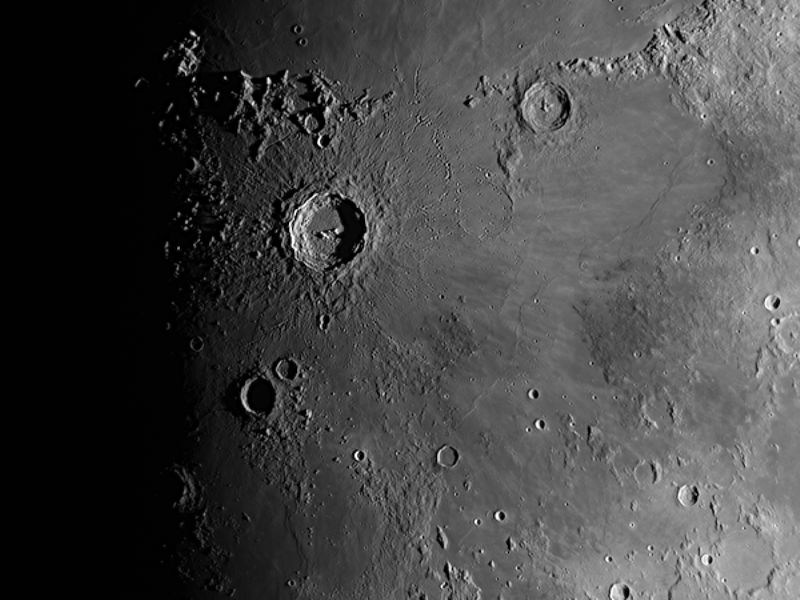
But I was "teaching a new dog old tricks" by doing the same thing with different infrastructure.
The camera wasn't different;
I used my DMK21AU04 monochrome video camera with an IR-pass filter, so this is an infrared picture,
as many of my earlier moon shots have been.
But I did the recording under Linux Mint 18 using
oaCapture software.
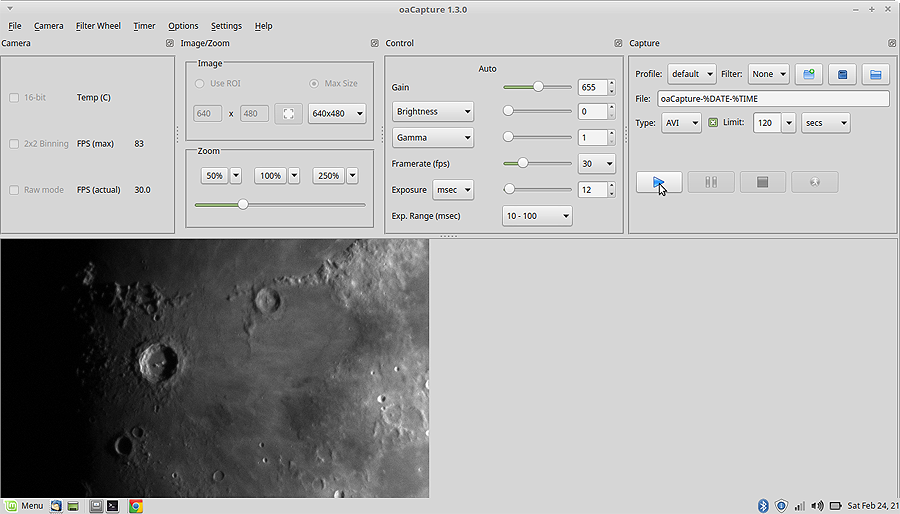
My ulterior motive? To move my image acquisition process over to Linux, just in case more Windows
updates come along that disrupt video functionality, as they have in the past.
The scientific imaging community is starting to distrust Microsoft because of
"breaking changes" delivered in involuntary updates.
If astronomers are inconvenienced, medical imagers must be terribly inconvenienced.
An operating system in which updates are compulsory may just not be suitable for scientific work.
Anyhow, oaCapture only surprised me in one way. It created AVI files requiring the Y800 codec, which
I was not able to play under Windows, since apparently that codec is no longer common
(though ideal for scientific video).
So after moving the video files over to a Windows machine, I ran them through PIPP (to change codecs)
and AutoStakkert (to stack the best 80% of about 3600 video frames).
(Addendum:) Those AVI files can be played by Linux's Media Player
and by VLC Video Player under Windows and Linux.
AutoStakkert 3.0.14 opens them but reports "operation cancelled" as soon as I click Analyze.
I am told this will be fixed in 3.0.15.
AutoStakkert 2.6.8 handles them fine.
Alternatively, the SER files from oaCapture go right into AutoStakkert 3, but cannot be played
by anything at all as far as I can tell.
Then I did the sharpening with PixInsight (Multiscale Linear Transform) rather than the usual Registax.
Although PixInsight's software is a bit simpler (ha! when is anything in PixInsight simpler than
anywhere else?), I got very good results. I actually enlarged the picture a little. This is surprising
because it was taken in unsteady air and I wasn't expecting much.
What I haven't solved yet is autoguiding under Linux. But a solution is coming, and I'll share it with you.
Permanent link to this entry


|
2018
February
21
|
Billy Graham, 1918-2018
[Revised for conciseness.]
Rest in peace, Billy Graham.
As a Christian, I am glad to point to Billy Graham as a good example. He only taught clear, central Christian doctrines, didn't try to start his own version of Christianity, didn't push a set of personal opinions, and avoided politics in public (although behind the scenes he encouraged, among other things, the civil rights movement). He built bridges between Christians of different backgrounds and effectively presented Christ to the world.
It is a pity that such good examples are so few.
By the way, I am not claiming he had no faults. He did make mistakes. But he didn't demand that other people follow
him into his mistakes. He didn't establish Grahamism as a movement.
And that made him radically different from almost all televangelists today.
Permanent link to this entry


|
2018
February
20
|
"Nancy"
The comic strip "Nancy," which I remember from my childhood but had not seen in years,
has come to an unusually dignified end. The concluding episode, dated February 18,
shows the wedding of Aunt Fritzi and Phil Fumble, who had been dating off and on since
the 1930s.
They should have held out for a full century.
Permanent link to this entry


|
2018
February
19
|
Are you hateful enough?
[Revised for conciseness.]
During the past couple of years of political mudslinging, many Americans
(especially Christians who should definitely know better)
have lowered their moral standards in a way that is much more serious
than just condoning a candidate's adultery or someone's political corruption.
They have come to believe it's desirable to hate and despise fellow humans
and fellow citizens — and disparage, misrepresent, and stereotype them.
Depending on where you stand on the political spectrum, you're supposed to
despise, disparage, and misrepresent Muslims, immigrants,
people on welfare, "liberals," "conservatives," "evangelicals", Democrats,
Republicans, Tennessee football fans...
Actually, that last one may be the key to it.
People are engaging in the pretend tribal warfare of football fans
rather than in good citizenship.
The country's problems will not be solved by "memes" and trash talk.
Hatefulness is wrong.
Anyone who promotes hatefulness has given up the moral high ground.
Permanent link to this entry


|
2018
February
18
|
Paintings with colors that don't photograph
Scott Pope, artist of the atmosphere
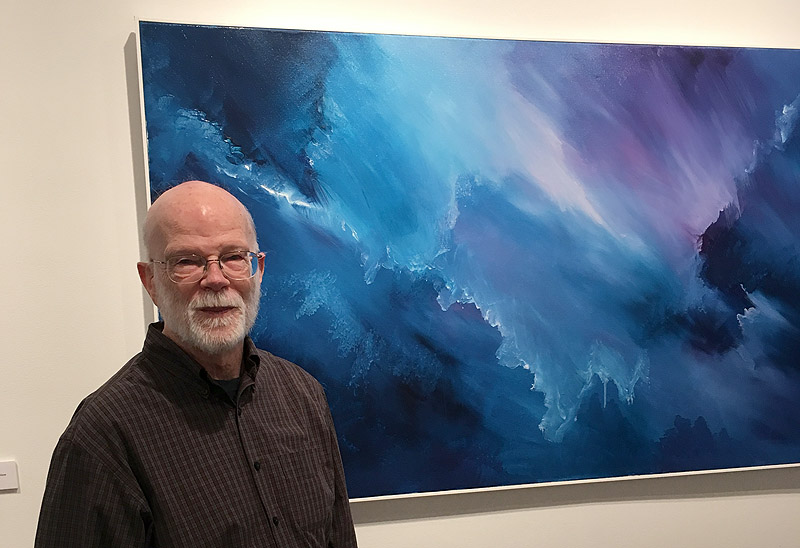
This afternoon Melody and I went to Athens Academy for the opening of an art exhibit featuring
(as one of two artists) our old friend Scott Pope.
In Melody's student days, he ran (and nowadays he owns) an art store called The Loft
where she went for art supplies. We've all kept in touch, and today we got to see some
of his paintings.
Scott's specialty is the earth's atmosphere seen from the inside — that is,
bright clouds, sunsets, and the like. I knew from seeing the pictures on line that he was good.
But what I didn't know is that his paintings have colors in them that can't be photographed.
The one in the picture above, for instance. On the left, it has vivid bluish-greens that
the camera utterly failed to capture. And on the right it has vivid reddish-purples.
The camera made it all into blue. As photographed, it's a good picture, but
we're missing a lot!
Scott uses pigments invented in the 20th Century, phthalocyanine and a newer one whose
name I didn't catch. They must have very unusual spectrograms.
They certainly remind us that there are colors the computer screen can't render
(nor can color printers). Because of the way primary colors work, a mix of any given
red, green, and blue (additively) can render any hue, but not at full saturation.
These extremely saturated greens and purples are "out of gamut," not achievable by
mixing the colors available on the computer screen or on color printers.
Permanent link to this entry


|
2018
February
17
|
A cautionary note for Christian organizations
[Revised for conciseness.]
This is mainly for my fellow Christians, although it will interest others because
of some parallels to civic clubs, hobbyist organizations, and the like.
It's something I was well aware of in my student days, and it came up again in
conversation yesterday.
Christian organizations outside the church,
and special-purpose organizations within it,
run the risk of becoming clubs for people who (1) have time on their
hands, and (2) want lots of fellowship.
If the purpose of the organization is to gather under-utilized people and get them doing
something worthwhile, then all is well.
If it is to provide Christian fellowship to people who might otherwise lack it
(often very important to students), then yes, by all means.
But what about ministering to people who are already very busy with their God-given vocation
(job, family, or, with students, their studies) and are not lonely?
If you're not careful, they're simply left out.
Worse, you may actively discourage them from doing something more
important than coming to your meetings.
Permanent link to this entry


|
2018
February
14-16
|
Florida
In response to the tragedy in Florida, I want to point out that
mass shootings in peacetime are not common in any other country.
That is a fact to be dealt with.
What's different this time is that the shooter was captured alive.
That's important. It means the story isn't over and won't be ignorable — or distortable —
for a while yet. There will be an investigation and punishment.
The shooter won't be a mysterious antihero who died in a blaze of glory; he will be
imprisoned for decades.
Anyone telling his story will have to point out that he's a prisoner.
Permanent link to this entry


|
2018
February
12-13
|
"Just ignore it" is nonsense
Yesterday I got e-mail from a Russian would-be extortionist who wanted $360 to not release
video he had supposedly obtained of me doing something indecent that I hadn't done,
supposedly recorded with a computer that didn't have a working video camera.
And although he gave a Bitcoin address, he had no way of knowing which of his victims had
actually paid (Bitcoin is anonymous).
So it was rather obvious that his threat was empty.
I wrote about it on Facebook, to warn others and to reflect on how crime-ridden the Internet
has become. I also did a bit of investigating to see if this one could be caught
(and did get a rather good lead).
One of the replies I got on Facebook was, "Just use the delete key. Just ignore them."
Those are the same people who say "look at the Caller ID and ignore" the spam telephone calls.
By the time I've looked at the Caller ID, it has already interrupted me.
Likewise, people used to smugly say "just use the delete key" on spam —
"all you need is the delete key."
That might be OK if you only get two or three spams a day, but I get 500 a day.
I am not going to plow through hundreds of them to see if I happen
to have any real e-mail.
That is not what "ignore" means.
Thank goodness for spam filtering.
But aggressive and effective prosecution of fraudsters would be better.
By the way, bogus e-mail asking for money — for any imaginable reason — is extremely
common. Fake bills for web services are much more common than extortion, but I occasionally get
some of anything you can imagine. Do not pay bills that arrive by e-mail unless you are
certain they are correct. Remember, you don't owe money just because somebody typed a message
saying you do. And make sure your older, less experienced family members know this.
One more thought. I care about ordinary people, not just people with my level of
experience and technical skill. I've seen the Internet's follies since Yale linked up to CUNY in 1978.
But there are still plenty of people in the world who are relatively new to the Internet and who
are accustomed to the business practices of 40 years ago, when almost anything put in writing was
from an accountable source. I'm not here to look down on people with less experience than myself.
That's why I keep passing along warnings like this.
And it's why I keep pressing for cybercrime to be done away with, rather than smugly congratulating
myself on knowing how to avoid being a victim.
Permanent link to this entry


|
2018
February
11
|
Improved BatchPreprocessing script for PixInsight
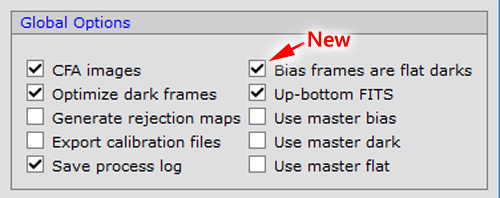
Astrophotographers, take note: If you use
PixInsight and you calibrate with darks,
flats, and flat darks, you'll have a use for my modified version of
their BatchPreprocessing script.
Update: The latest version, finished this very evening (Feb. 10), also gives you a quick
way to perform cosmetic correction (hot and cold pixel detection) without creating an instance icon.
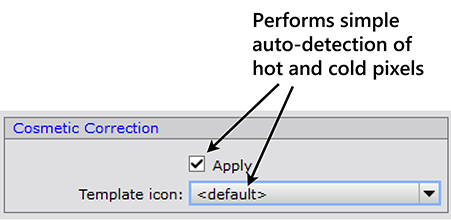
Click here for more information.
Permanent link to this entry


|
2018
February
10
|
A lot of Monoceros
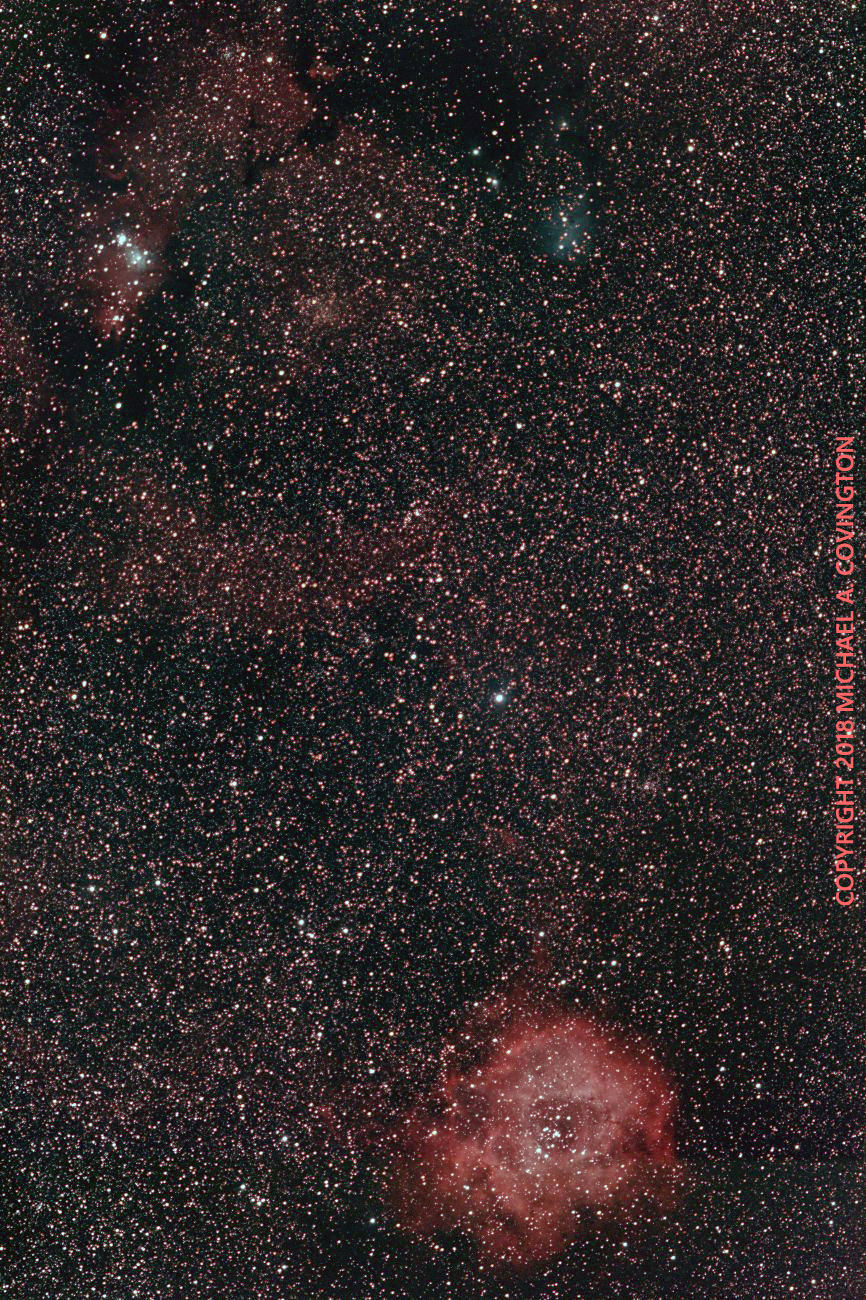
This is a wide-field view of the constellation Monoceros, from the Christmas Tree Cluster
(near top left) to the Rosette Nebula (bottom right). At the very top, about 1/3 of the way
from left to right, you can see the
unnamed nebula that I've written about.
What is a Monoceros, you ask? A unicorn (mono- 'one', keros 'horn'). (A rhinoceros is a nose-horn, rhino- and keros in Greek.)
And where is this celestial unicorn? It's basically a blank area of sky, rich with faint stars, nebulae, and clusters,
just to the left (east) of Orion. In ancient times it was not considered a constellation at all,
just an "unformed" area of the sky. Petrus Plancius named it Monoceros around 1612.
If you can see a unicorn there, you're doing better than I am.
Nonetheless, Monoceros has become one of my favorite areas of the sky because of all the
star clusters and nebulae. Although there are no bright nearby stars, we are looking out along
a rather thick area of the Orion arm of our galaxy.
This picture looks strange because the lens, filter, and camera did not entirely cooperate.
I used a Canon 60Da (with extended red sensitivity) to bring out the nebulae, an Astronomik CLS filter
to try to cut the effect of streetlights, and a Nikon 180/2.8 ED AIS lens from the early 1980s,
which, although it uses ED glass, is not quite free of chromatic aberration in the deep red.
So the stars came out with red halos, probably not visible at the image scale shown here,
but enough to make their images reddish.
This is a stack of 40 (yes, 40) 2-minute exposures at ISO 800.
Due to a change in the camera position, the very top and bottom of the
picture do not comprise all 40 images, but merely 20, which is
still plenty.
Permanent link to this entry


|
2018
February
1-9
|
Back from obscurity
Some astrophotos are coming soon. In the meantime...
After an unprecedented three-week hiatus, the Daily Notebook resumes.
I continue to be very busy with another writing project.
But I've gotten so tired of the foolishness shoved at me on Foolbook — I mean Facebook —
that I'd rather write somewhere that doesn't have a "reply" button.
A lot of people are out there arguing silly things, such as impossibly naive versions of
political philosophies, not to mention the people who think the earth is flat and pigs can fly.
Two things people have recently tried to make me believe are:
(1) The word none stands for not one and can therefore be used only in the singular.
(False; check any dictionary. Not my job to argue about it.)
(2) Trump's Tweets on Twitter are the best thing about him.
(Ouch! Even his strongest supporters wince at the things he puts on Twitter,
late at night, without consulting anyone.)
Permanent link to this entry
One and a half cheers for libertarianism
One more political topic. Someone asked me if I am a libertarian. No, although I do
believe the parts of libertarianism that are part of our American heritage; just not the
whole thing. I think the whole thing goes too far.
I agree with the libertarians that governments are things that people form voluntarily;
the people are prior to the government; there is no king that inherently owns everything
and then allows us to have some of it. I agree that the power and the cost of government
have to be justified.
But I think a good bit more government is justified than the libertarians think.
Genuinely good and worthwhile functions for government continue to be invented.
Not all of them are erosions of our freedom. (Do federal highways erode your freedom?
Really?)
I also think governments have the right to compel people under their care to participate.
That is, you can't just declare yourself independent and stop paying taxes.
You are using government services (such as national defense) even if you live in a cabin
in the woods. You owe the government something for them.
And that is why I reject the motto "taxation is theft."
Permanent link to this entry


|
|
|
This is a private web page,
not hosted or sponsored by the University of Georgia.
Copyright 2018 Michael A. Covington.
Caching by search engines is permitted.
To go to the latest entry every day, bookmark
http://www.covingtoninnovations.com/michael/blog/Default.asp
and if you get the previous month, tell your browser to refresh.
Portrait at top of page by Krystina Francis.
Entries are most often uploaded around 0000 UT on the date given, which is the previous
evening in the United States. When I'm busy, entries are generally shorter and are
uploaded as much as a whole day in advance.
Minor corrections are often uploaded the following day. If you see a minor error,
please look again a day later to see if it has been corrected.
In compliance with U.S. FTC guidelines,
I am glad to point out that unless explicitly
indicated, I do not receive substantial payments, free merchandise, or other remuneration
for reviewing or mentioning products on this web site.
Any remuneration valued at more than about $10 will always be mentioned here,
and in any case my writing about products and dealers is always truthful.
Reviewed
products are usually things I purchased for my own use, or occasionally items
lent to me briefly by manufacturers and described as such.
I am an Amazon Associate, and almost all of my links to Amazon.com pay me a commission
if you make a purchase. This of course does not determine which items I recommend, since
I can get a commission on anything they sell.
|
|









